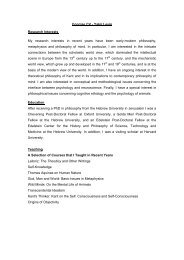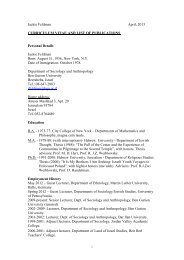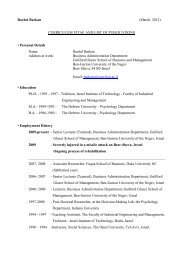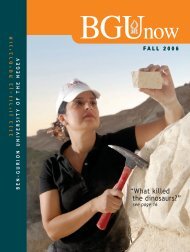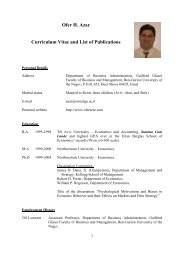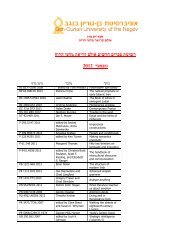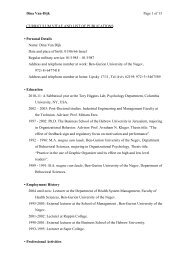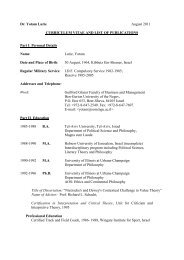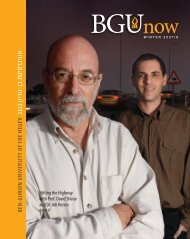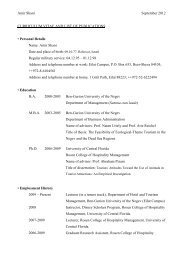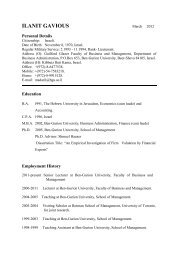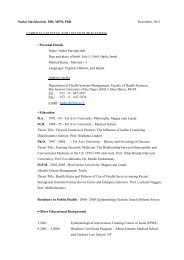Book of Abstracts
Book of Abstracts
Book of Abstracts
You also want an ePaper? Increase the reach of your titles
YUMPU automatically turns print PDFs into web optimized ePapers that Google loves.
42<br />
lessons for adapting and mitigating the causes and effects <strong>of</strong> global environmental disasters, such as desertification<br />
and climate change.<br />
With an increased understanding <strong>of</strong> the Namib’s desert ecology and its practical application at NaDEET Centre,<br />
participants gain skills and the necessary attitude to live in a more sustainable manner in their own communities.<br />
NaDEET Centre’s approach is, therefore, to learn from the desert and to apply it to human needs. Living at NaDEET<br />
Centre for a week-long programme allows participants to temporarily forget the demands <strong>of</strong> their daily lives and<br />
immerse themselves in the beauty <strong>of</strong> the desert. Just as desert creatures do, participants learn to live with less water<br />
and to utilise the ample sunshine for all <strong>of</strong> their energy needs, for example, using solar cooking. NaDEET Centre’s<br />
facilities are designed to respect the natural resources available in the area and to utilise them in a sustainable<br />
manner. This can be an example for environmental education programmes to teach participants the necessary skills<br />
to deal with a changing climate.<br />
Learning to live more lightly: Children’s understanding, attitudes and behavior in arid regions<br />
Constantinos C. Manoli; University <strong>of</strong> Cyprus; manoli@ucy.ac.cy<br />
Bruce Johnson; University <strong>of</strong> Arizona; brucej@email.arizona.edu<br />
Andreas Ch. Hadjichambis; CYCERE 1 ; a.chadjihambi@cytanet.com.cy<br />
Demetra Hadjichambi; University <strong>of</strong> Cyprus; demhad@ucy.com.cy<br />
Υiannis Georgiou; Cyprus University <strong>of</strong> Technology; yiannis_epa@hotmail.com<br />
Hara Ioannou, CYCERE 1 ; hara_art@hotmail.com<br />
1 Cyprus Centre for Environmental Research and Education<br />
Introduction: While educational programs provide the foundations <strong>of</strong> environmental awareness and concern about<br />
human impact in an effort to shape the development <strong>of</strong> environmental behavior (Bogner, 1998, 2004; Gigliotti,<br />
1990), many <strong>of</strong> these programs focus primarily on environmental issues and problem-solving skills, failing to<br />
address the attitudinal and behavioral components (Johnson & Manoli, 2011; Waliczek, & Zajicek, 1997). Empirical<br />
studies provide evidence that addressing knowledge alone is not enough to lead to changes in behavior (Johnson &<br />
Manoli, 2008). In order for humans to make decisions and take action for a more sustainable life in arid regions (for<br />
example, reducing water consumption), they need to understand the natural systems <strong>of</strong> the world, grasping the big<br />
picture <strong>of</strong> how life works and learning how to live within them (Johnson, 2007). The present study investigated the<br />
impact <strong>of</strong> an earth education program, Earthkeepers, on students’ ecological understandings, environmental attitudes<br />
and ecological behavior in Cyprus, an island with very limited access to fresh water. The program helps children<br />
make personal choices on how to live more lightly on the planet, such as using less energy and fewer materials.<br />
Methods: Participants were 196 fourth – seventh grade students from six public schools in Cyprus. All students<br />
participated in Earthkeepers (Van Matre & Johnson, 1988), an earth education program that helps participants<br />
construct ecological understandings, develop positive feelings for the natural world and make choices about their<br />
personal environmental behaviors (Johnson, 2003). For the purpose <strong>of</strong> this study, students’ ecological<br />
understandings, environmental attitudes and ecological behavior were measured and compared both before and after<br />
the program. Finally, individual semi-structured interviews with 12 students and 9 teachers helped verify the<br />
quantitative results and provide further information about the impact <strong>of</strong> the program.<br />
Results: The analysis <strong>of</strong> the results showed gains both in students’ understandings as well as changes toward more<br />
pro-environmental attitudes (due to the limit <strong>of</strong> the abstract, statistical results/tables will be provided during the<br />
presentation). The student and teacher interviews supported the quantitative results and confirmed that the<br />
participants undertook more ecological actions after the program. Very similar results were found in arid regions in<br />
the US (Arizona) and other countries where the Earthkeepers program is used (Martin, 2003; Johnson & Manoli,<br />
2010). Earth education programs can make a great contribution to learning about sustainability in the arid lands as<br />
they have the potentials to enhance students’ ecological understandings, attitudes and behavior for a more<br />
sustainable lifestyle.



